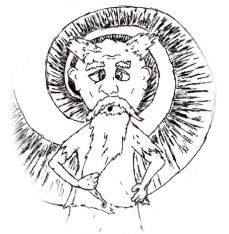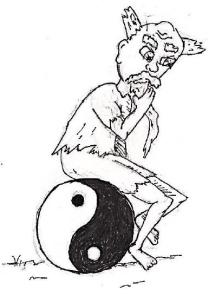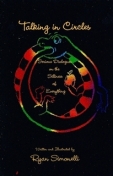Here’s my recently fin ished book of dialogues, a thought experiment of sorts, which had been over four years in the making. Now, many philosophers conduct thought experiments, creative hypothetical scenarios designed to trigger certain philosophical intuitions, but this book is a thought experiment of a different sort; it’s about experimenting with thought, throwing oneself down the “philosophical rabbit-hole,” losing touch with reality, and trying to re-gain ones footing.
ished book of dialogues, a thought experiment of sorts, which had been over four years in the making. Now, many philosophers conduct thought experiments, creative hypothetical scenarios designed to trigger certain philosophical intuitions, but this book is a thought experiment of a different sort; it’s about experimenting with thought, throwing oneself down the “philosophical rabbit-hole,” losing touch with reality, and trying to re-gain ones footing.
In the dialogues, the various characters get stuck in “The Loop,” an overarching and all-encompassing philosophical system that undermines any attempt to pin down the way things really are. The stars of the dialogues are Mr. Thinker, a man driven mad pondering im ponderable questions, a magical genie who desperately aims to answer to these questions, and Pete, a normal guy who causes all of this trouble by asking these questions. In the process of falling hopelessly into the Loop, the characters have some rather earth-shattering encounters with things that are quite difficult to describe such as enlightenment, ego-death, mystical union, and even the book itself. The journey takes you seemingly farther and farther down the rabbit-hole only to pop you out exactly where you jumped in, bringing the loop full circle. All of this is followed by an epilogue which discusses some of the great “loopy” philosophers of the millennium such as Nāgārjuna, Nietzsche, and Wittgenstein, and attempts to explain the sort of thing that just happened.
ponderable questions, a magical genie who desperately aims to answer to these questions, and Pete, a normal guy who causes all of this trouble by asking these questions. In the process of falling hopelessly into the Loop, the characters have some rather earth-shattering encounters with things that are quite difficult to describe such as enlightenment, ego-death, mystical union, and even the book itself. The journey takes you seemingly farther and farther down the rabbit-hole only to pop you out exactly where you jumped in, bringing the loop full circle. All of this is followed by an epilogue which discusses some of the great “loopy” philosophers of the millennium such as Nāgārjuna, Nietzsche, and Wittgenstein, and attempts to explain the sort of thing that just happened.
 Hopefully, Talking in Circles will take you for a pretty wild ride. It may be written in a light and amusing fashion, but it’s not for the faint of heart!
Hopefully, Talking in Circles will take you for a pretty wild ride. It may be written in a light and amusing fashion, but it’s not for the faint of heart!
If you want a physical copy so that you can read it wherever you want without having to look at a computer screen, you can get one here for really cheap (like three bucks!).

[…] is a modified excerpt from the epilogue of my book, Talking in Circles: Serious Dialogues on the Silliness of Everything, a book which is itself intended to be one big looping trick. It also just won the 2nd place […]
Where can i purchase the pdf? Thank you for sharing your knowledge
The pdf is free! I link to it in this post (although I think it’s undergone a few edits since I linked it, so I should probably update that).
I just wanted to let you know how much I enjoyed your extended dialogue. In the winter of 2014, I had a blood clot in my brain which caused me to completely loose my memory. A week in the hospital and a few months of therapy allowed most of my memory, aside from the years 2012 and 2013, to return. In any case, I had a lot of time to sit at home before returning from work and, one day, I decided to get back on the internet. I don’t know how I found you, but some search brought me directly here and my curiosity made me download the pdf and start to read. I loved it and wanted to tell you how much it spoke to me about my feelings of being “outside” and learning about the things I at one time already knew. Like the day I discovered through the newspaper’s “on this day in history” column where it was talking about President Obama’s’ first few months of his second term when I had no recollection that he had been reelected.
In any case, I wanted to thank you and ask if you’ve written anything like a “how to” guide to compose a written philosophical dialogue. I’ve discovered recently that aside from a few comments in books geared more towards philosophy papers, little exists. I’d be curious what your thoughts on the matter would be.
Glad you enjoyed it! That’s really interesting to know that it was reminiscent of memory recollection for you–it’s certainly a theme throughout the dialogues, and the book is actually meant so it can be read more than once and give the reader that sort of feeling that the characters express at various points.
I haven’t written anything like a “how to” guide for philosophical dialogues, and I don’t really know if I could, since I think a lot of what works will vary from person to person. However, I can say a bit about my personal writing process. Basically, I just try to mentally occupy two (or more) conflicting positions and bump them against each other in writing, not knowing what the eventual resolution will be until it actually emerges in the course of the dialogue. Dialogues are a very old medium for philosophy, going back at least to Plato, and I think it’s a very good way to flesh out philosophical thoughts. In fact, I also do academic philosophy, and, though the main medium for such philosophy is academic papers and books, I often find my arguments by writing a dialogue first, before turning it into a paper.